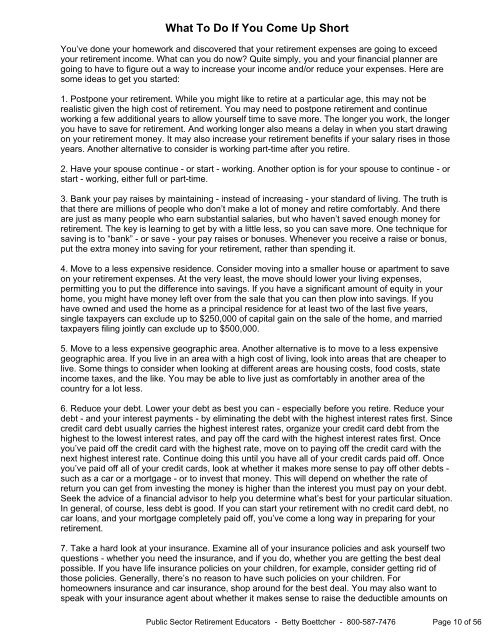Create successful ePaper yourself
Turn your PDF publications into a flip-book with our unique Google optimized e-Paper software.
What To Do If You Come Up Short<br />
You’ve done your homework and discovered that your retirement expenses are going to exceed<br />
your retirement income. What can you do now? Quite simply, you and your financial planner are<br />
going to have to figure out a way to increase your income and/or reduce your expenses. Here are<br />
some ideas to get you started:<br />
1. Postpone your retirement. While you might like to retire at a particular age, this may not be<br />
realistic given the high cost of retirement. You may need to postpone retirement and continue<br />
working a few additional years to allow yourself time to save more. The longer you work, the longer<br />
you have to save for retirement. And working longer also means a delay in when you start drawing<br />
on your retirement money. It may also increase your retirement benefits if your salary rises in those<br />
years. Another alternative to consider is working part-time after you retire.<br />
2. Have your spouse continue - or start - working. Another option is for your spouse to continue - or<br />
start - working, either full or part-time.<br />
3. Bank your pay raises by maintaining - instead of increasing - your standard of living. The truth is<br />
that there are millions of people who don’t make a lot of money and retire comfortably. And there<br />
are just as many people who earn substantial salaries, but who haven’t saved enough money for<br />
retirement. The key is learning to get by with a little less, so you can save more. One technique for<br />
saving is to “bank” - or save - your pay raises or bonuses. Whenever you receive a raise or bonus,<br />
put the extra money into saving for your retirement, rather than spending it.<br />
4. Move to a less expensive residence. Consider moving into a smaller house or apartment to save<br />
on your retirement expenses. At the very least, the move should lower your living expenses,<br />
permitting you to put the difference into savings. If you have a significant amount of equity in your<br />
home, you might have money left over from the sale that you can then plow into savings. If you<br />
have owned and used the home as a principal residence for at least two of the last five years,<br />
single taxpayers can exclude up to $250,000 of capital gain on the sale of the home, and married<br />
taxpayers filing jointly can exclude up to $500,000.<br />
5. Move to a less expensive geographic area. Another alternative is to move to a less expensive<br />
geographic area. If you live in an area with a high cost of living, look into areas that are cheaper to<br />
live. Some things to consider when looking at different areas are housing costs, food costs, state<br />
income taxes, and the like. You may be able to live just as comfortably in another area of the<br />
country for a lot less.<br />
6. Reduce your debt. Lower your debt as best you can - especially before you retire. Reduce your<br />
debt - and your interest payments - by eliminating the debt with the highest interest rates first. Since<br />
credit card debt usually carries the highest interest rates, organize your credit card debt from the<br />
highest to the lowest interest rates, and pay off the card with the highest interest rates first. Once<br />
you’ve paid off the credit card with the highest rate, move on to paying off the credit card with the<br />
next highest interest rate. Continue doing this until you have all of your credit cards paid off. Once<br />
you’ve paid off all of your credit cards, look at whether it makes more sense to pay off other debts -<br />
such as a car or a mortgage - or to invest that money. This will depend on whether the rate of<br />
return you can get from investing the money is higher than the interest you must pay on your debt.<br />
Seek the advice of a financial advisor to help you determine what’s best for your particular situation.<br />
In general, of course, less debt is good. If you can start your retirement with no credit card debt, no<br />
car loans, and your mortgage completely paid off, you’ve come a long way in preparing for your<br />
retirement.<br />
7. Take a hard look at your insurance. Examine all of your insurance policies and ask yourself two<br />
questions - whether you need the insurance, and if you do, whether you are getting the best deal<br />
possible. If you have life insurance policies on your children, for example, consider getting rid of<br />
those policies. Generally, there’s no reason to have such policies on your children. For<br />
homeowners insurance and car insurance, shop around for the best deal. You may also want to<br />
speak with your insurance agent about whether it makes sense to raise the deductible amounts on<br />
Public Sector Retirement Educators - Betty Boettcher - 800-587-7476 Page 10 of 56




